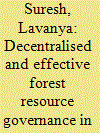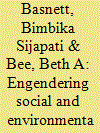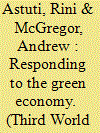| Srl | Item |
| 1 |
ID:
151141


|
|
|
|
|
| Summary/Abstract |
Within the context of decentralised environmental governance, this article seeks to answer the question which institutional arrangements may be most effective in delivering the promise of better community-centred forest governance. The specific objective is to analyse the impact that decentralisation of resource management has on the effectiveness of forest governance. Using a comparative case study framework, the article finds that decentralisation functions better when nested structures with a plurality of bodies are in operation. However, the case studies also highlight the need for constant monitoring as a necessarily ongoing crucial process to protect the ecological sustainability of forest resource governance as well as strengthening equitable social structures at the village level.
|
|
|
|
|
|
|
|
|
|
|
|
|
|
|
|
| 2 |
ID:
152077


|
|
|
|
|
| Summary/Abstract |
Drawing on feminist and development literature, this paper suggests several important lessons and considerations for building equitable approaches to REDD+. Specifically, we illustrate the conceptual and practical significance of women’s participation for achieving the goals of REDD+as well as the limits and opportunities for gendering participation in REDD+. We argue that the standing debates over how and in what context gender becomes instrumentalised, technicalised or institutionalised in development provide important cautionary tales for the implementation and reporting of REDD+safeguards. By doing so, this paper contributes to the growing literature on gender, development, natural resource management and REDD+.
|
|
|
|
|
|
|
|
|
|
|
|
|
|
|
|
| 3 |
ID:
142659


|
|
|
|
|
| Summary/Abstract |
This paper analyses the technologies of government that proponents of the Reducing Emissions from Deforestation and forest Degradation (REDD+) mechanism are adopting to influence forest governance in Indonesia. It analyses the aspects of forest governance being problematised; the solutions being constructed; and who is influencing the production and content of these solutions. The research focuses on three aspects of the One Map Initiative: the forest moratorium; forest licensing; and new standards in participative mapping. Our findings show that the initiative has created new opportunities and constraints for forest reform. New disciplinary and participatory technologies have emerged that have created political spaces for activists to actively promote social and environmental justice concerns. However, our analysis also shows tensions for forest stakeholders between engaging in the new opportunities of the green economy and the risk of having political issues rendered technical.
|
|
|
|
|
|
|
|
|
|
|
|
|
|
|
|
| 4 |
ID:
147458


|
|
|
|
|
| Summary/Abstract |
One of the unexpected outcomes of increased regional integration in southern Laos has been a boom in household production and roadside sale of wood charcoal. This paper develops an ethnographically informed analysis of charcoal as a socially embedded market, providing insights into the sociopolitical relations of access, legal and extra-legal regulations, and the distribution of rents that characterise this trade. Contrary to some assumptions about charcoal as a necessarily exploitative commodity, this paper points to some of the advantageous income smoothing opportunities that charcoal presents for many rural Lao households and detail the complex ways in which charcoal production can relate to forest sustainability and degradation. The paper elaborates a perspective of entrepreneurial Lao charcoal communities, energetically utilising locally available natural resources, for direct cash income. Charcoal production networks also connect everyday household livelihoods in Laos to large-scale extractive industry, in ways that have been arguably underemphasised previously. At the same time, the charcoal trade highlights the structural limits to notions of smallholder agency and local participation in commodified market relations, within broader political-economic contexts decidedly shaped through uneven development, and accumulation through dispossession.
|
|
|
|
|
|
|
|
|
|
|
|
|
|
|
|